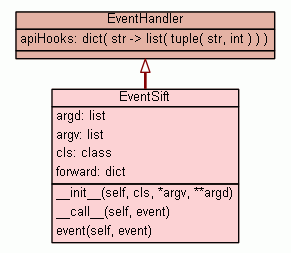Class EventSift
source code

Event handler that allows you to use customized event handlers for
each process you're attached to.
This makes coding the event handlers much easier, because each
instance will only "know" about one process. So you can code
your event handler as if only one process was being debugged, but your
debugger can attach to multiple processes.
Example:
from winappdbg import Debug, EventHandler, EventSift
# This class was written assuming only one process is attached.
# If you used it directly it would break when attaching to another
# process, or when a child process is spawned.
class MyEventHandler (EventHandler):
def create_process(self, event):
self.first = True
self.name = event.get_process().get_filename()
print "Attached to %s" % self.name
def breakpoint(self, event):
if self.first:
self.first = False
print "First breakpoint reached at %s" % self.name
def exit_process(self, event):
print "Detached from %s" % self.name
# Now when debugging we use the EventSift to be able to work with
# multiple processes while keeping our code simple. :)
if __name__ == "__main__":
handler = EventSift(MyEventHandler)
#handler = MyEventHandler() # try uncommenting this line...
with Debug(handler) as debug:
debug.execl("calc.exe")
debug.execl("notepad.exe")
debug.execl("charmap.exe")
debug.loop()
Subclasses of EventSift can prevent specific event types
from being forwarded by simply defining a method for it. That means your
subclass can handle some event types globally while letting other types
be handled on per-process basis. To forward events manually you can call
self.event(event).
Example:
class MySift (EventSift):
# Don't forward this event.
def debug_control_c(self, event):
pass
# Handle this event globally without forwarding it.
def output_string(self, event):
print "Debug string: %s" % event.get_debug_string()
# Handle this event globally and then forward it.
def create_process(self, event):
print "New process created, PID: %d" % event.get_pid()
return self.event(event)
# All other events will be forwarded.
Note that overriding the event method would cause no
events to be forwarded at all. To prevent this, call the superclass
implementation.
Example:
def we_want_to_forward_this_event(event):
"Use whatever logic you want here..."
# (...return True or False...)
class MySift (EventSift):
def event(self, event):
# If the event matches some custom criteria...
if we_want_to_forward_this_event(event):
# Forward it.
return super(MySift, self).event(event)
# Otherwise, don't.
|
|
__init__(self,
cls,
*argv,
**argd)
Maintains an instance of your event handler for each process being
debugged, and forwards the events of each process to each
corresponding instance. |
source code
|
|
|
|
|
|
|
event(self,
event)
Forwards events to the corresponding instance of your event handler
for this process. |
source code
|
|
|
Inherited from object:
__delattr__,
__format__,
__getattribute__,
__hash__,
__new__,
__reduce__,
__reduce_ex__,
__repr__,
__setattr__,
__sizeof__,
__str__,
__subclasshook__
|
|
dict( str → list( tuple( str, int ) ) )
|
apiHooks = {}
Dictionary that maps module names to lists of tuples of ( procedure
name, parameter count ).
(Inherited from winappdbg.event.EventHandler)
|
|
list
|
argd
Keyword arguments to pass to the constructor of cls.
|
|
list
|
argv
Positional arguments to pass to the constructor of cls.
|
|
class
|
cls
Event handler class.
|
|
dict
|
forward
Dictionary that maps each debugged process ID to an instance of cls.
|
|
Inherited from object:
__class__
|
__init__(self,
cls,
*argv,
**argd)
(Constructor)
| source code
|
Maintains an instance of your event handler for each process being
debugged, and forwards the events of each process to each corresponding
instance.
- Parameters:
cls (class) - Event handler class. This must be the class itself, not an
instance! All additional arguments passed to the constructor of
the event forwarder will be passed on to the constructor of this
class as well. - Overrides:
object.__init__
Warning:
If you subclass EventSift and reimplement this method, don't
forget to call the superclass constructor!
See Also:
event
|
|
Forwards events to the corresponding instance of your event handler
for this process.
If you subclass EventSift and reimplement this method, no event will be
forwarded at all unless you call the superclass implementation.
If your filtering is based on the event type, there's a much easier
way to do it: just implement a handler for it.
|
cls
Event handler class. There will be one instance of this class per
debugged process in the forward dictionary.
- Type:
- class
|

